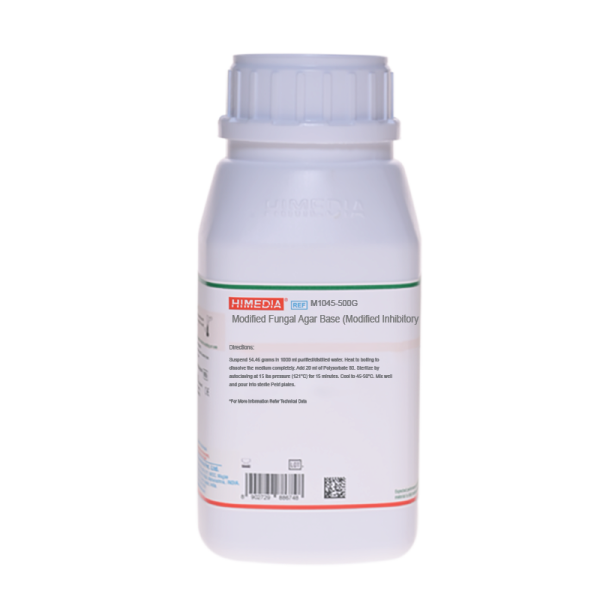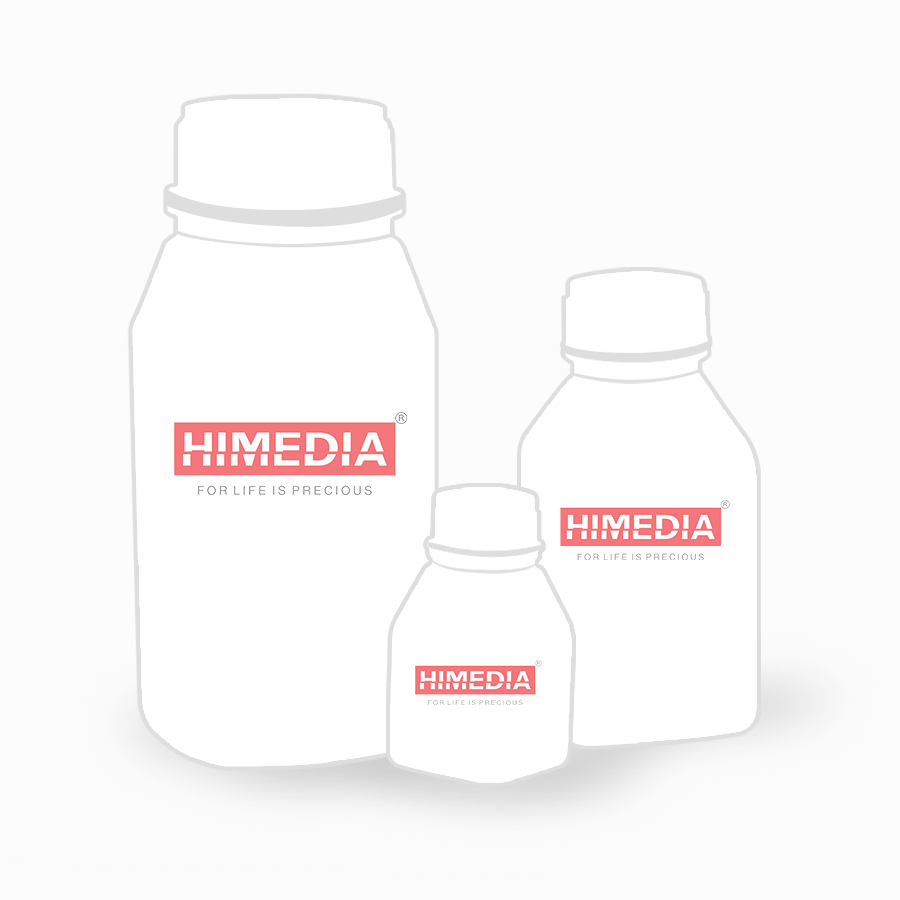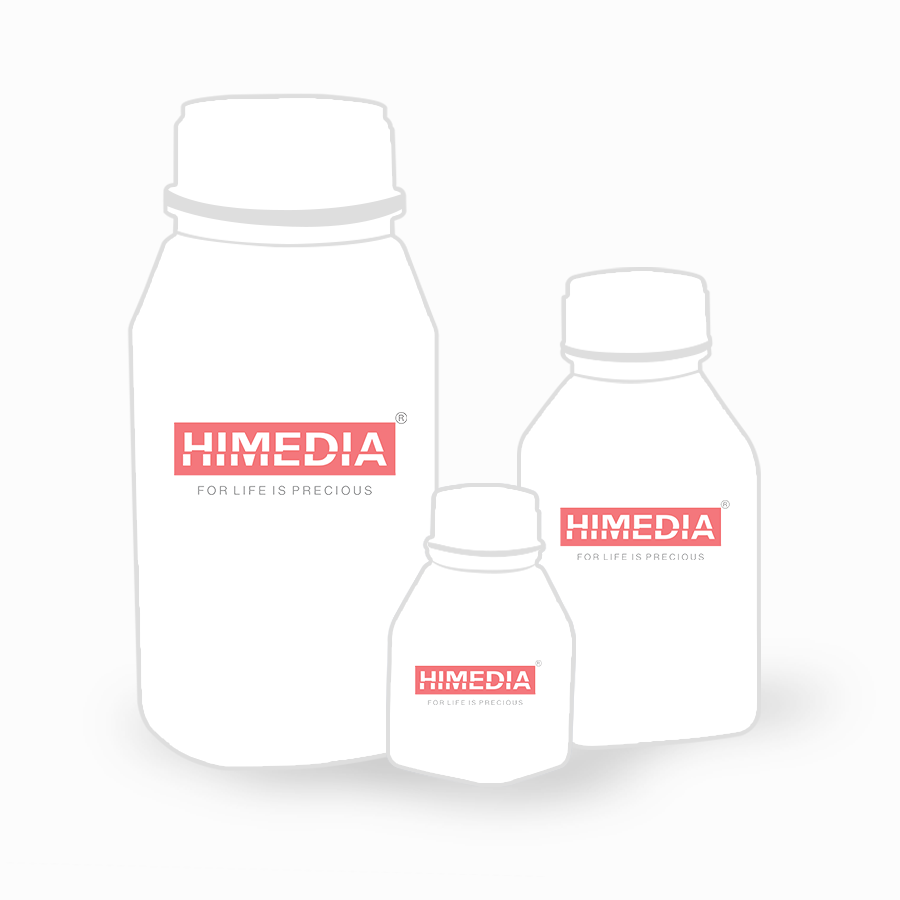 Your enquiry has been submitted
Your enquiry has been submitted
Modified Fungal Agar Base (Modified Inhibitory Mould Agar Base)
Estimating Counts of Fungi - Yeasts and Molds#CC293D
Intended Use
Recommended for estimation of moulds in cosmetics and toiletries.
Composition
| Ingredients | Gms/Litre |
|---|---|
| Tryptone | 2.500 |
| Peptone | 2.500 |
| Yeast extract | 5.000 |
| Dextrose (Glucose) | 20.000 |
| Disodium hydrogen phosphate | 3.500 |
| Potassium dihydrogen phosphate | 3.400 |
| Ammonium chloride | 1.400 |
| Sodium carbonate | 1.000 |
| Magnesium sulphate | 0.060 |
| Chloramphenicol | 0.100 |
| Agar | 15.000 |
Final pH (at 25°C): 7.0±0.2
Formula adjusted, standardized to suit performance parameters
Directions
Suspend 54.46 grams in 1000 ml purified/distilled water. Heat to boiling to dissolve the medium completely. Add 20 ml of Polysorbate 80. Sterilize by autoclaving at 15 lbs pressure (121°C) for 15 minutes. Cool to 45-50°C. Mix well and pour into sterile Petri plates.
Principle and Interpretation
Modified Fungal Agar Base is formulated as described by Mead and ONeill (3) for estimating moulds in cosmetics and toiletries. Earlier culture media developed for determining mould counts in cosmetics and toiletries etc. required upto 7 days of incubation for the valid count (4,5,6), unlike Mead and ONeill formulation which requires 3 days at 27.5 ± 0.5°C. The medium contains peptone, tryptone, yeast extract, dextrose and inorganic salts which makes it a very nutritious medium. Potential contaminants of cosmetics and toiletries like Serratia marcescens are effectively inhibited by the Chloramphenicol in the medium. Sodium and potassium phosphates make the medium well buffered. Polysorbate 80 serves as a neutralizer of preservatives such as methyl paraben and physically hold or seclude the surfactants like sodium lauryl sulphate and lauroyldiethanolamide. These surfactants might suppress the growth or the spore germination of moulds (4). The pH of the medium is neutral which inactivates preservatives such as benzoic acid that is active at pH values below 6.0 but not active at pH near to the neutrality (6).
Type of Specimen
Cosmetic products
Specimen Collection and Handling
After use, contaminated materials must be sterilized by autoclaving before discarding.
Warning and Precautions
Read the label before opening the container. Wear protective gloves/protective clothing/eye protection/face protection. Follow good microbiological lab practices while handling specimens and culture. Standard precautions as per established guidelines should be followed while handling specimens. Safety guidelines may be referred in individual safety data sheets.
Limitations
- The 27.5 ±0.5°C incubation temperature is critical for obtaining scrupulously significant mold counts after three days.
- Being selective medium a non selective media can be tested in parallel to recover all microorganisms.
- Some organism may show poor growth due to nutritional variation.
Performance and Evaluation
Performance of the medium is expected when used as per the direction on the label within the expiry period when stored at recommended temperature.
Quality Control
Appearance: Cream to yellow homogeneous free flowing powder
Gelling: Firm, comparable with 1.5% Agar gel
Colour and Clarity of prepared medium: Amber coloured, clear to slightly opalescent gel forms in Petri plates
Reaction: Reaction of 5.46% w/v aqueous solution at 25°C. pH: 7.0±0.2
pH: 6.80-7.20
Cultural Response
Cultural characteristics observed after an incubation at 27 - 28°C for 48 - 72 hours.
| Organism | Inoculum (CFU) | Growth | Recovery |
|---|---|---|---|
| # Aspergillus brasiliensis ATCC 16404 (00053*) | 50-100 | good-luxuriant | |
| Escherichia coli ATCC 25922 (00013*) | >=104 | inhibited | 0% |
| Pseudomonas aeruginosa ATCC 27853 (00025*) | 50-100 | none-poor | <=10% |
Key: *Corresponding WDCM numbers. #Formerly known as Aspergillus niger
Storage and Shelf Life
Store dehydrated and the prepared medium at 15-25°C. Use before expiry date on the label. On opening, product should be properly stored dry, after tightly capping the bottle in order to prevent lump formation due to the hygroscopic nature of the product. Improper storage of the product may lead to lump formation. Store in dry ventilated area protected from extremes of temperature and sources of ignition. Seal the container tightly after use. Product performance is best if used within stated expiry period.
Disposal
User must ensure safe disposal by autoclaving and/or incineration of used or unusable preparations of this product. Follow established laboratory procedures in disposing of infectious materials and material that comes into contact with sample must be decontaminated and disposed of in accordance with current laboratory techniques (1,2).
References
- Isenberg, H.D. Clinical Microbiology Procedures Handbook 2nd Edition.
- Jorgensen, J.H., Pfaller, M.A., Carroll, K.C., Funke, G., Landry, M.L., Richter, S.S and Warnock., D.W. (2015) Manual of Clinical Microbiology, 11th Edition. Vol. 1.
- Mead and ONeill, 1986, J. Soc. Cosmet. Chem., 37 : 49.
- The United States Pharmacopeia, 1985, 21st rev., United States Pharmacopeial Convention, Rockville, MD.
- U.S. Food and Drug Administration, 1984, Bacteriological Analytical Manual, 6th ed., AOAC. Arlington, Va.
- Williams (Ed.), 1984, Official Methods of Analysis of the AOAC, 14th ed., AOAC, Arlington, Va.
| Product Name | Modified Fungal Agar Base (Modified Inhibitory Mould Agar Base) |
|---|---|
| SKU | M1045 |
| Product Type | Regular |
| Physical Form | Powder |
| Origin | Animal |
| Packaging type | HDPE |
| References | 1.Mead and ONeill, 1986, J. Soc. Cosmet. Chem., 37 : 49.2.U.S. Food and Drug Administration, 1984, Bacteriological Analytical Manual, 6th ed., AOAC. Arlington, Va.3.Williams (Ed.), 1984, Official Methods of Analysis of the AOAC, 14th ed., AOAC, Arlington, Va.4.The United States Pharmacopeia, 1985, 21st rev., United States Pharmacopeial Convention, Rockville, MD. |





